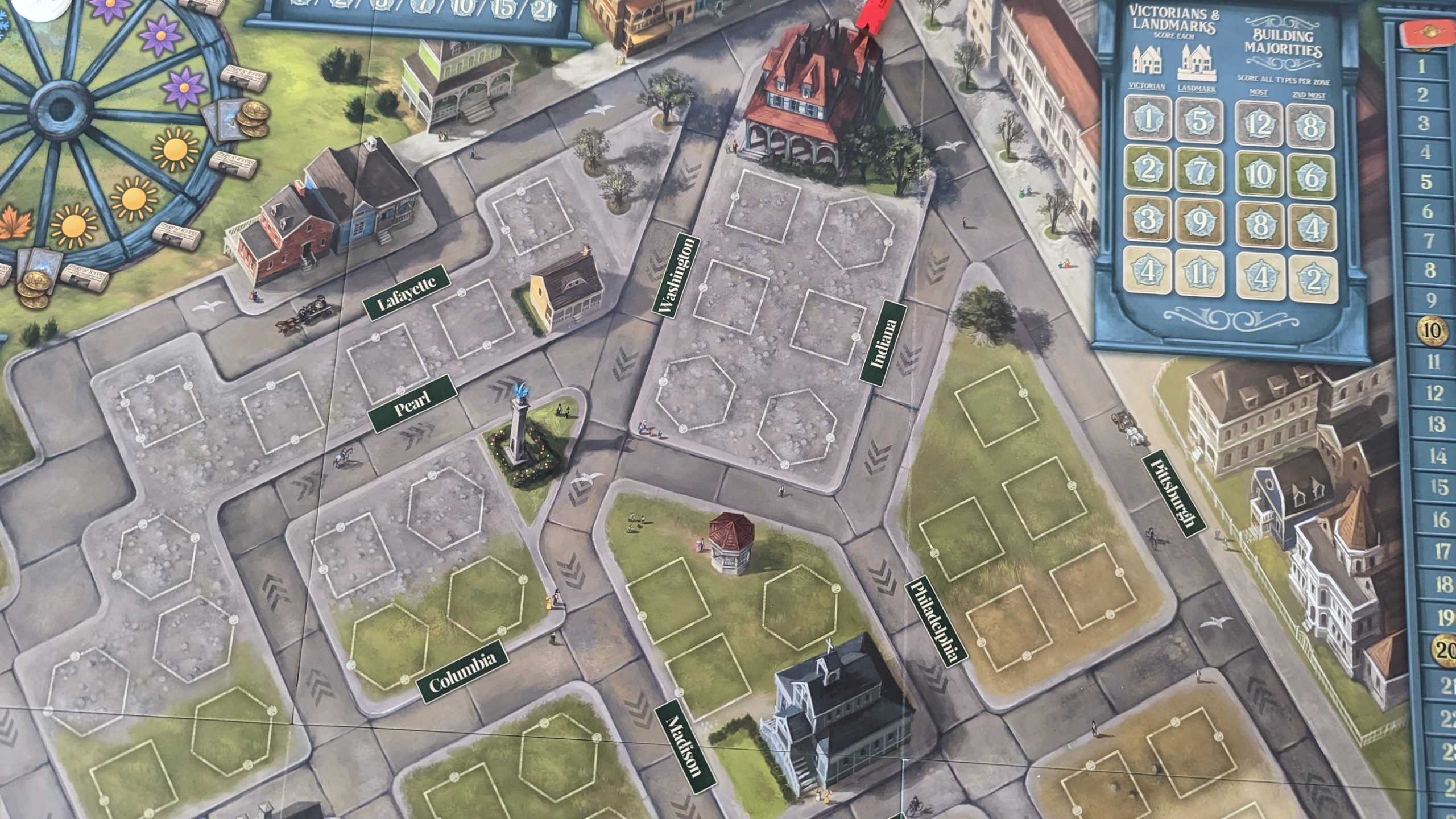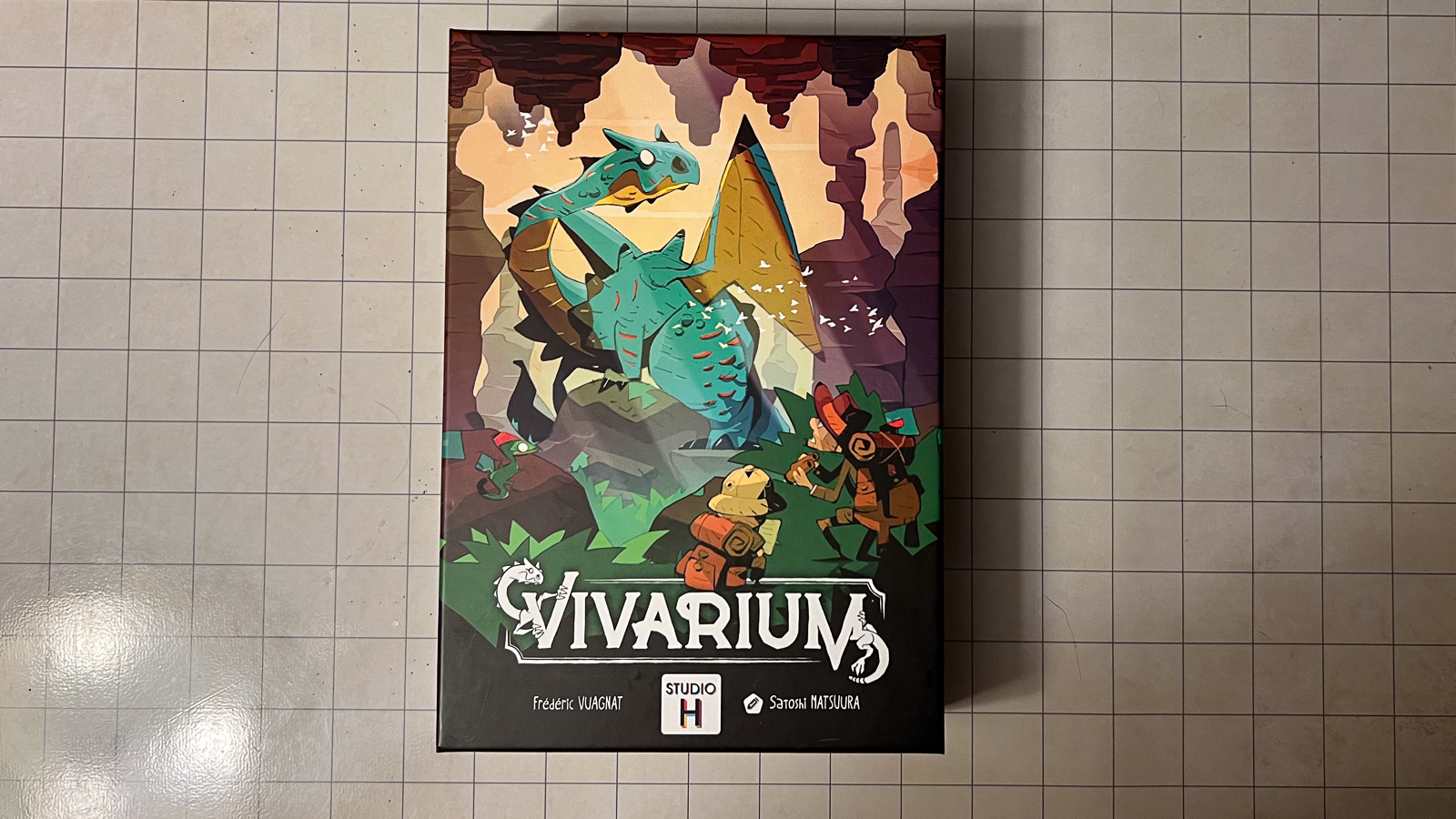As the market for gateway games becomes increasingly flooded, publishers have to find a way to make their titles stand out from the crowd. For Cape May, Thunderworks attempted the flagship economic gateway title, an intersection of gaming categories that’s already rather rare. Every part of the design and production feels like an intentional decision to appeal to gateway gamers, which means the real question is how successful were they?
Gameplay follows the players as they walk around the titular resort town, slapping down retail and rental properties in adjacent lots, as if they were capitalist Elsas. Player turns consist of three actions, which could be playing a movement card, taking money, building, upgrading adjacent buildings, playing an activity card, drawing more activity cards, or picking up used movement cards. That may seem like a lot, but in practice, it’s rather simple, and a couple of those options only exist to make sure you never have to just pass, and even then you’re provided the decision between investing in future action efficiency and flat money. Play continues like this until the end of the game, where players total up their scores from their secret objectives, area majority in zones, and flat points from Victorians and landmarks depending on their zone.

I was honestly impressed by a whole lot of Cape May. The core of movement card management combined with the economic puzzle of improving income versus getting actual points distills a lot of what makes economic games compelling for numbers geeks like me into a beginner-friendly package. Fortunately, it isn’t just the mechanics that will entice beginners into economic puzzling, you’ve also got a top-notch production. The biggest part is the building minis, which adds heft to the upgrade actions that make them more pleasurable to people who aren’t satisfied by simply seeing a number go up. Alongside the minis, you’ve got gorgeous art and linen finish cards to make this game ooze quality. Well there you go, Cape May is the perfect gateway economic game to toss in front of people who haven’t discovered the joys of spending fake money to make fake money, review done?

If only, dear reader. Unfortunately, Cape May suffers from one of the worst cases of system bloat I’ve seen in a game. I cannot emphasize enough how much I adore the core hand management/ area majority economic puzzle that this game has going for it, but my approach to game design is that every beyond the first two or three mechanics need a good reason to exist, and Cape May is chock-full of systems that simply exist for the sake of existing. Let’s start with the bird bag(not box), cause it’s an innocent good example that cascades into more egregious ones. At certain points in the game, you’ll grab a bird token from the bag which scores escalating amounts for each unique bird, so you’re incentivized to go heavy into the bird system or ignore it entirely. Problem is, without the accompanying secret objective, you’ll wind up having a fair share of dead duplicate draws. There are upgrade cards that help with the bird strategy, but then we hit the problem with upgrade cards: there are four separate decks with no index or reference for what’s in each, so unless you know the decks by heart, you have no way of knowing where you should be investing into upgrading in order to help any particular strategy. In fact, in one of my postgame chats, a player was surprised to learn that there were bird-related upgrades, as she never saw one the entire game, but that’s not the worst of it. During another game, my dad picked the bird objective and went heavy bird. He was doing really well, and was looking to coasting into an easy victory until the last round where he ran afoul of the event deck. You see, Cape May has the worst event decks I’ve seen, as if it was taken wholesale from an 80s children’s game. Most of the time, it’s just a mild annoyance or boost, like everyone gets a few bucks, or the area you were planning on working in gets a bit more expensive that round. Sometimes, it’s literally nothing, like payouts for landmarks too early in the game for anyone to have built one. But then, there’s what happened to my dad. We drew an event that said “no birds this round, sorry.” Well, that cost him so many points that he wound up in a distant second. It’s like the game manifested a real bird that shat on his face. Coming back to everything needing a reason to exist in a game, I’ve got to ask, what purpose does the event deck serve? To add randomness? All I’ve seen it do is either nothing or something so bad I never want to play the game again. What does the upgrade deck do? Let you buff your playstyle? Without knowing what cards are in which deck, you can’t know where to go to get what you want. Finally, why is the bird bag in this game? To give people that don’t like economic games something to do? Then why in Satan’s name are you forcing them to play an economic game in the first place?

I really want to like Cape May, but it just has too much in its box that I want to bag up and throw in a drawer for my tastes. But hey, you could very easily not care about my nitpicks as much as I, or even like them, in which case you really should add it to your collection.
PROS
- Top of the line production, especially for a gateway game
- The core game of movement card management tied in with the economic puzzle is exquisite
CONS
- There's too much going on for no good reason
- I want to eradicate this event deck from all spacetime
Nick grew up reading fantasy novels and board game rules for fun, so he accepted he was a dork at an early age. When he's not busy researching the intricacies of a hobby he'll never pick up, Nick can be caught attempting to either cook an edible meal or befriend local crows.
See below for our list of partners and affiliates:

 1 year ago
119
1 year ago
119







